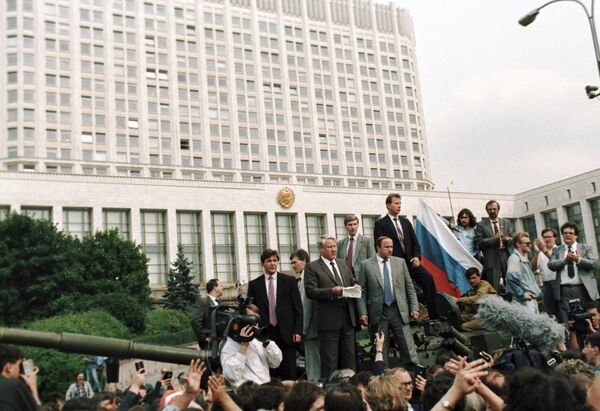I remember that summer very well working as a correspondent here in Moscow. There was a lot of tension already in the political scene before the putsch happened. And Gorbachev was trying to negotiate the new Union treaty and new arrangements for holding the Soviet Union together. This was a very complicated process and it was having a great deal of difficulty so we knew there was plenty of tension; we knew there was tension with the military as well.
But I remember very well how the putsch began, how I first heard about it. I was at home; I’d been working in Moscow as a correspondent for a few months. It was a sunny warm summer morning and I received a phone call at my apartment about seven o’clock in the morning from one of my French colleagues who called me and said “Chris, I’m just calling to let you know that the TASS news agency has just published a very short dispatch saying that Gorbachev is sick and he’s going have to take a rest for a while and that this group of other people is going to take charge of the country while he’s away resting.” And that was just like a bolt of lightning when he said that and that instant I knew “this is huge” and I had no idea of how huge it was going to become, but I still knew that it was giant. I didn’t even have breakfast, I don’t even think I took a shower, I ran out of my apartment with no socks or shoes. I jumped in my car and drove very fast to the office, got there at around 7:30 in the morning, started working and I don’t think I stopped working for the next four months. Every single day, seven days a week, we had 14-15-hour days, just constantly producing news about what was happening.
I remember those three days very well, because that first morning it was sunny, but that evening there was a large T-72 tank parked at the corner of our building that housed foreign correspondents and it had sort of crushed the small, Volkswagen Beetle car that was parked outside our building and that belonged to a very large gentleman by the name of Kim who was one of the editorial assistants that worked at the New York Times.
And when I wasn’t in the office writing stories I was running around town trying to see what was going on, where people were moving. It was extremely exciting. And in those moments when we, foreign correspondents, had a little bit of time to look away from our screens and stop writing about was happening, these things we were writing and these things we were seeing and the things that were happening looked so surreal, that was like a dream, it seemed to be unreal. We were writing stories, we were just reporting facts but in those moments when we got back away from this a little bit, it was hard for us to believe those things we were writing and seeing.
I remember that disconnect very well between the facts of what we were witnessing in the streets of Moscow and the massiveness of the story.
On the second day of this three-day putsch the weather turned bad, it was very hot and muggy but rainy. I remember trying to get around town – there was more traffic in the streets and in the car it was very hot as there was no air conditioning and I had to keep the windows up when the rain was falling. I remember all of those events like if it were just yesterday.
It was probably the biggest story I’ve ever covered in terms of its transcendent historical importance. I was just constantly full of energy and passion; my eyes were open all the time. As a journalist I felt like I was performing on the very top level of what I was capable of. And it was nice to know that people around the world were actually paying attention for a change.
And then I remember Gorbachev coming back. Not too long after that there was a press conference and I found myself standing next to him, trying to get my tape recorder near him so I could hear what he was saying, and I remember looking at the back of his head and thinking: “Whatever happens, this man standing here is going to be a very large character in history of the world for a long time to come.”
It was an extraordinary experience for us.
The 1991 coup through the eyes of a foreign correspondent

© RIA Novosti
/ Subscribe
I remember that summer very well. I was working as a correspondent here in Moscow. There was a lot of tension already in the political scene before the putsch happened. And Gorbachev was trying to negotiate the new Union treaty and new arrangements for holding the Soviet Union together.


